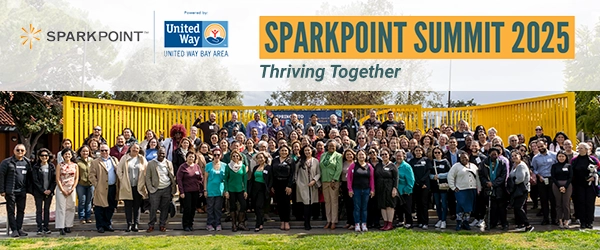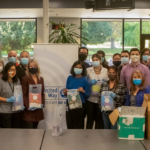Search
SparkPoint Summit 2025
How We Can Thrive Together—Even Now
March 25, 2025

The tension in the room was often unspoken yet unmistakable, manifesting itself in the occasional “What if…”Indeed, SparkPoint™ Summit 2025: Thriving Together convened at a moment when the future feels increasingly unstable. Those who gathered weren’t just facing abstract challenges—they were grappling with real crises: funding cuts, job losses, mass deportations, and landscape where solutions seem temporary at best. And still, there was hope.
The demand for answers was urgent. People came not only to listen but also to seek a way forward—for themselves, their families, and their communities.
Confronting Reality and Building Solutions
United Way Bay Area CEO Keisha Browder set the tone early by acknowledging the stakes and the urgency for action. When she accepted a check from Wells Fargo on behalf of United Ways of California, it represented more than just a financial boost—it was a notable investment in the work ahead at a time when this funding is as critical as ever.
However, while financial investment is a piece of the puzzle, maintaining support for social programs that drive solutions will also require community and courage. The keynote speakers for the event, Ana Mendoza, UWBA Ambassador and Owner of G&A Farms, LLC, and Kiwoba Allaire, CEO and Founder of Girl STEM Stars, embodied resilience and action in the face of overwhelming odds.
Mendoza’s story of survival from being trafficked as a child by her parents to rebuilding her life with the help of SparkPoint was a reminder that when we talk about resources, we are actually talking about the people who use them, who have the opportunities to move beyond their current struggles. Today, she runs her own business on a 40-acre farm that she owns, while raising her two kids.
“It starts with discipline. I tell my son it’s okay to feel depressed, but we still have to get up. With everything going on, we all need each other. So it’s okay to feel sad. It’s not okay to stay there.” – Ana Mendoza, UWBA Ambassador
Allaire discussed the recurring theme of being the only executive who was also a Black woman in the room at several tech companies she had worked for . She explained how her hard-earned connections within those networks ultimately provided her access to people and procedures that literally saved her life when a medical emergency forced her doctors to induce a coma for three weeks. That kind of access shouldn’t be a privilege; yet for many, it is.
“I kept asking, asking, ‘Can we hire more people who look like myself, or Marlo, or Jose?’ And it would fall on deaf ears. And I realized… instead of whining and complaining, let me be the change I wanted to see.” – Kiwoba Allaire, CEO and Founder of Girl STEM Stars
After her recovery, she recognized not only that young girls from marginalized communities were being sidelined in Science, Technology, Engineering, and Math (STEM) fields but also that she needed to be the one to provide them with that chance. That’s why she founded an organization to ensure that young girls aren’t excluded from STEM careers and the opportunities they offer, to give them access to the resources she had utilized, and to help them build networks of their own.
“Working in Silicon Valley, being the only one – at Facebook I was on a campus of 3,000 people, and I was 1-of-3, riding my little bike – it’s fun until you realize everybody is staring at you like… Imposter syndrome set in hard and fast, and I didn’t want any other little girl to feel like that.” – Kiwoba Allaire, CEO and Founder of Girl STEM Stars
Both women had every reason to give in or be overwhelmed by the weight of the challenges they faced. Instead, they acted. They recognized how and where they could make an impact in their own lives and in the lives of others, and they moved those mountains.
Out of the Box
During the breakout sessions, action manifested as practical and immediate strategies for finding solutions. Some topics concentrated on economic solutions such as Guaranteed Basic Income, while others addressed the harsh realities of immigration, where the stakes are life-altering.
Here are the key takeaways:
- Understand your rights. The legal landscape is changing—knowing the difference between an ICE request and a judge-signed warrant can be crucial for safety.
- Seek legal support if possible. A lawyer is frequently the strongest line of defense.
- Timeliness is crucial. Missing a deadline for paperwork or a court date can jeopardize a case.
- Resources are available, but they are limited. If you need assistance, seek it now.
Every session, every conversation returned to the same truth: The government will not save us. The system isn’t designed to protect us. Therefore, we must be there for each other and safeguard one another.
A Call to Act—Because There is No Alternative
Although this summit was for SparkPoint stakeholders, it encompassed more than just financial stability – it emphasized connectivity, the significance of these resources for the community, and the essential role the community plays in driving change. By the end of the summit, no one was under the illusion that change would come easily. However, the mood was not one of defeat.
Because the through line of the day wasn’t just resilience—it was responsibility.
Responsibility to act when possible.
Responsibility to advocate for solutions, understanding that they won’t come to us easily.
Responsibility to show up—not just for ourselves, but for one another.
The people who walked into that room carried burdens. Yet, they also carried something even more powerful: the determination not to give up.
The result? A collective understanding that action is not optional; it is essential.
Waiting for change is not a strategy. Building it is.


